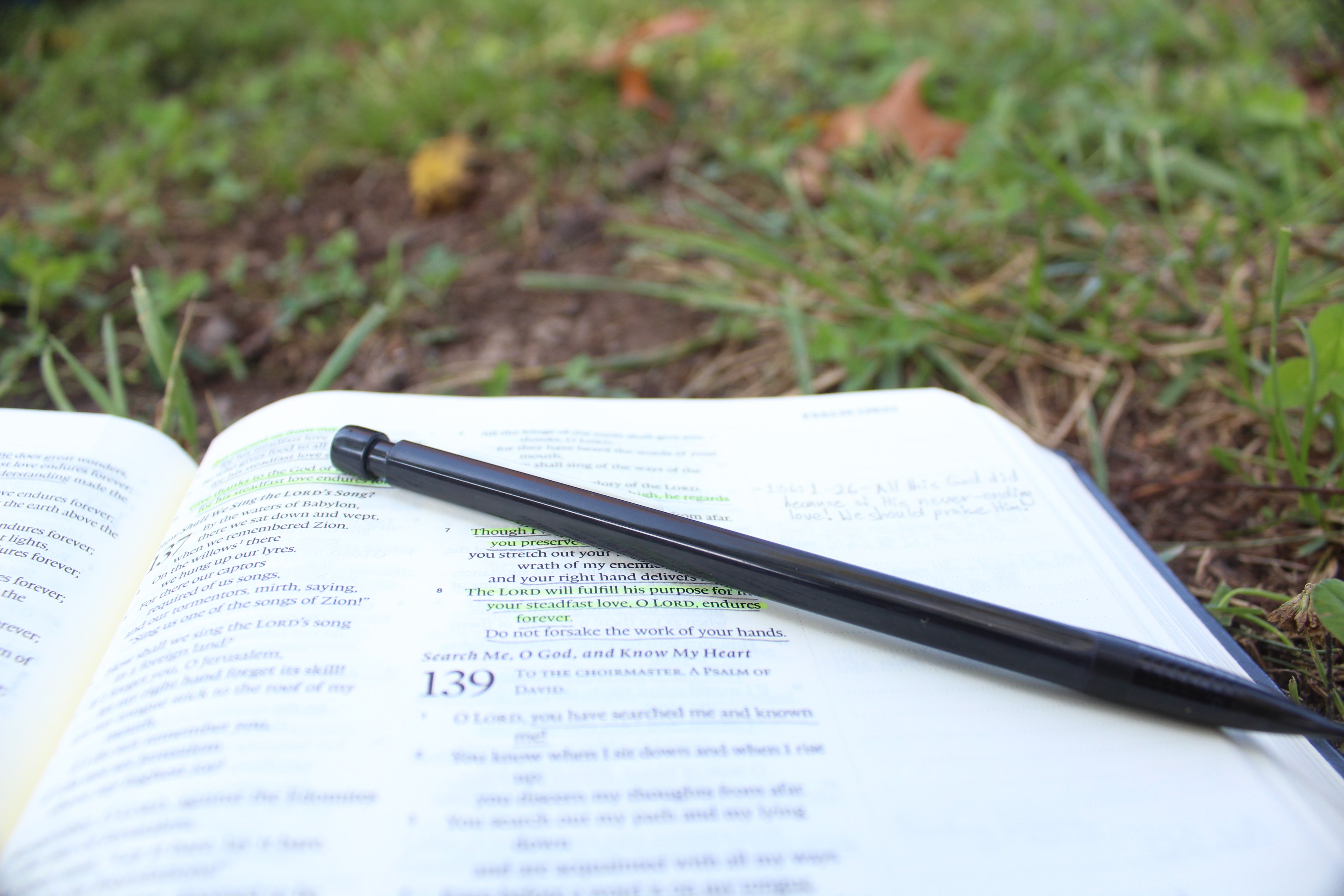Attention is the common currency, and we are short on change. Whether scrolling for distraction or checking our computers for important emails, our minds are frequently stuck in a haze of digital distractions. Where does time spent with God fall in this game of tug-of-war? Jacob Stratman, Dean of the College of Bible, Humanities and Art at John Brown University, gave the student body, faculty and staff an example of what time spent in silence with God can look like. He led the student body in a ‘tech-free’ Chapel session on Tuesday, Sept. 30. This occasion featured a relaxed reading of scripture by Stratman, in between the typical sets led by the worship team.
Keith Jagger, university chaplain, opened the Chapel service by instructing the student body to put away their devices for the service. Many students find whatever time they can to study for exams, complete homework and submit assignments. Jagger called them to set these things aside, for he said, “productivity and success must not be an idol.” However, Jagger also urged all who needed to study for an exam to consider missing this chapel and single-mindedly setting themselves to work. After phones, computers and minds were quiet, worship began. The minds of the congregation were reminded to seek after and lean on God as students sang lyrics such as " I depend on You” and “Draw me close and teach me to abide.”
Stratman set the atmosphere for the service by bringing a chair onto the stage and taking a seat. He prompted students to follow his lead and find a comfortable position. With his Bible and an additional devotional book in hand, he asked those listening to consider whether they simply read scripture or if they let scripture read them and change them. This was a reminder for all to be wary of forming a transactional relationship with scripture. With that preface, the time of contemplation with the Word began.
As Daniel 3:1-30 was read, students were encouraged to close their eyes and allow their five senses to engage with the reading and lead them through the palace of Nebuchadnezzar, and to the flames which left Shadrack, Meshack and Abednego unscathed. After verse 30 was finished, two minutes of silence were taken to allow what was read to sink into the minds of the congregation. Following, Stratman read verses 13-27 again, asking that each person pay attention to a word or a phrase that stuck out to them. He said, “Let’s listen.” As the reading was followed by two minutes of silent contemplation.
A second time, the section of scripture was read and a two-minute segment of silence allotted; however, this time, Stratman encouraged the students to talk to God and ask Him about what stuck out to them. “Show me my people, come,” and “Where do I demand too much from myself or from others?” were two examples for the students to consider.
Worship closed the time of meditation, and students filed out of the Cathedral and on to their next class. Each person in the congregation entered the period of silence with varying clarity of mind. Sophomore Kirsten Higley said, “I think for me, today, it was harder. Sometimes I can sit in silence, but today I felt very distracted.”
Another Sophomore, Aleigha Bailiff, had a slightly different experience. “For me, it wasn’t. I think there’s always going to be times when there are distractions,” She said.
We rely on our devices and tech for many of the day’s responsibilities; however, people feel differently about this reliance. Higley said, “I usually don’t have notifications on for anything, and I leave Instagram for the week. It’s overwhelming, and I think it makes me less present when I’m thinking about it.” This lack of presence is one of the things that this Chapel hoped to address.
To have a meaningful relationship with someone, each person must be as present as possible. It can be frustrating to be in a deep, connecting conversation with someone, only to have one person pull their phone out, completely unrelated to the conversation. Not only is the sense of connection broken, but you may also feel a loss of value in the eyes of the person on their phone. God delights in connecting with us; however, this is difficult to achieve if He is the only one present. We can build this connection by setting aside times of silence and meditation, if only for a few minutes.
“I love sitting in silence. I think me now, compared to last year, is a lot more comfortable in silence, because I had Dr. Stratman for a class and he’s very big on it,” said Baillif. Both Higley and Bailiff confirmed that two minutes of meditative silence are common in Stratman’s classes, as was seen in the tech-free Chapel.
When asked about his practice in the classroom, Stratman said he centers the time of silence by saying, “Can we remind ourselves of God’s presence? Can we remind ourselves that we are the beloved, that God is pleased with us and loves us before we get into the task of the day?” If beginning and ending a class period with these thoughts and silent contemplations is beneficial, how more so would it be for a person to begin and end their days similarly?
Moving from the classroom to a personal practice, Stratman said, “Very pragmatically, what I’m hoping is that it slows me down more. That I’m paying attention to my breath, and that I’m paying attention to my position in the universe. That I’m not just moving and achieving and acting and going.” This movement of achieving and going is a common pace for most college students, although there are habits for combating the university rush. “I’m taking the time to stop, say a Psalm to myself, breathe the attributes of God that I need, listen,” he said.
Slowing down and finding a moment with God, free of digital noise and distraction, can be a luxury for students. Stratman suggests starting the day in prayer and scripture before anything else. The repetition of prayer and scripture is continued during the afternoon and into the evening, which sets the focus on God and His sovereignty. To make this easier in the hustle of homework and a busy social life, students can incorporate this by taking the time during their walk to and from classes to reflect on scripture and bring their petitions to God.
With the looming presence of midterms and exams, it can be difficult to remember these practices. Stratman reflected on his own practice. He said, “Last night we were out late, and I didn’t get to the evening ones, so instead of a sense of guilt or shame, it’s just like, God still loves me, and I’ll do it again.” The repetition of scripture should be a grounding practice to remind the individual of their relationship with God and His presence and not to bring down the weight of shame or guilt.
Little reminders throughout the day are enough to begin to be more aware of God. Stratman shared another practice of his. “I just pay attention to my breathing. The words I will say often throughout the day are ‘Lord, have mercy. Christ, have mercy.’ Just repeating that to myself,” he said.
In a tech-reliant, distracted world, finding meditative silence with God is difficult, and even though these exercises are beneficial, Stratman said, “ It’s not a magic pill, any of these practices, but I do think that wanting or becoming more available to what God has for me, what the Spirit is doing, by some of these practices…. The practices don’t save us, the disciplines, the things we do in a day, that’s not the center. It simply makes us more available to what God’s doing.”
The tech-free Chapel service was an opportunity for each person to consider how available they are making themselves to God. For students, building habits such as meditative silence, structuring the day around prayer and reminders through breathing can help sort through the haze of digital distractions and foster an openness with God.
Photo Courtesy of Hope Brittenham





